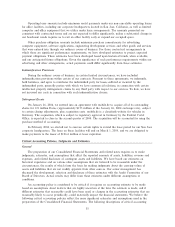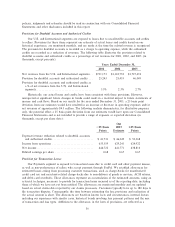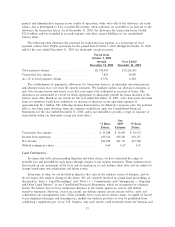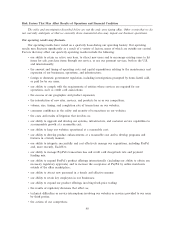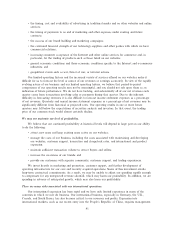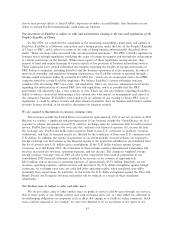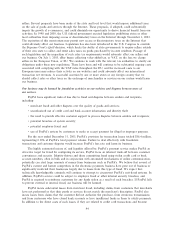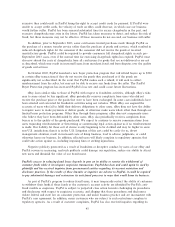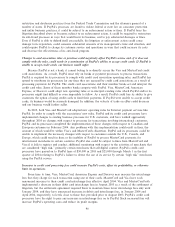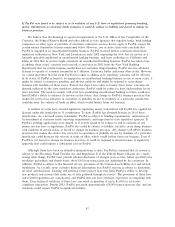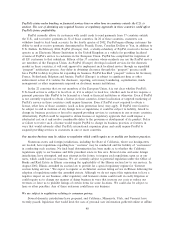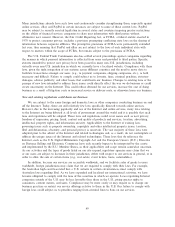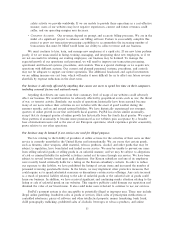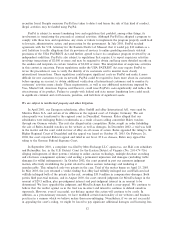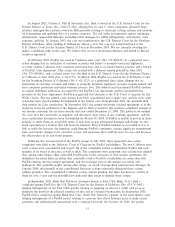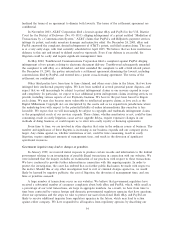eBay 2003 Annual Report Download - page 47
Download and view the complete annual report
Please find page 47 of the 2003 eBay annual report below. You can navigate through the pages in the report by either clicking on the pages listed below, or by using the keyword search tool below to find specific information within the annual report.excessive they could result in PayPal losing the right to accept credit cards for payment. If PayPal were
unable to accept credit cards, the velocity of trade on eBay could decrease, in which case our business
would further suÅer. PayPal has been assessed substantial Ñnes for excess chargebacks in the past, and
excessive chargebacks may arise in the future. PayPal has taken measures to detect and reduce the risk of
fraud, but these measures may not be eÅective. If these measures do not succeed, our business will suÅer.
In addition, prior to September 2003, some card issuers treated purchases made through PayPal as
the purchase of a money transfer service rather than the purchase of goods and services, which resulted in
reduced chargeback rights for the consumer if the consumer did not receive the goods or received
unsatisfactory goods. PayPal could be required to provide consumers full chargeback rights in such pre-
September 2003 cases, even if the normal time for exercising chargeback rights has expired. PayPal must
also now absorb the costs of chargebacks from all card issuers for goods that are not delivered or are not
as described, which may result in increased losses from merchant fraud and from disputes over the quality
of goods and services.
In October 2003, PayPal launched a new buyer protection program that will refund buyers up to $500
in certain eBay transactions if they do not receive the goods they purchased or if the goods are
signiÑcantly not as described. In the event that PayPal makes such a refund, it will seek to collect
reimbursement from the seller, but may not be able to receive any funds from the seller. The PayPal
Buyer Protection program has increased PayPal's loss rate and could cause future Öuctuations.
eBay faces similar risks to those of PayPal with respect to fraudulent activities, although eBay's risks
may to some extent be less signiÑcant. eBay periodically receives complaints from users who did not
receive the purchase price or the goods that were to have been exchanged. In some cases individuals have
been arrested and convicted for fraudulent activities using our websites. While eBay can suspend the
accounts of users who fail to fulÑll their delivery obligations to other users, eBay does not have the ability
to require users to make payments or deliver goods, or otherwise make users whole other than through our
limited buyer protection programs. Other than through these programs, eBay does not compensate users
who believe they have been defrauded by other users. eBay also periodically receives complaints from
buyers as to the quality of the goods purchased. We expect to continue to receive communications from
users requesting reimbursement or threatening or commencing legal action against us if no reimbursement
is made. Our liability for these sort of claims is only beginning to be clariÑed and may be higher in some
non-U.S. jurisdictions than it is in the U.S. Litigation of this sort could be costly for us, divert
management attention, result in increased costs of doing business, lead to adverse judgments, or could
otherwise harm our business. In addition, aÅected users will likely complain to regulatory agencies that
could take action against us, including imposing Ñnes or seeking injunctions.
Negative publicity generated as a result of fraudulent or deceptive conduct by users of our eBay and
PayPal services is increasing, and such publicity could damage our reputation, reduce our ability to attract
new users and diminish the value of our brand name.
PayPal's success in reducing fraud losses depends in part on its ability to restrict the withdrawal of
customer funds while it investigates suspicious transactions. PayPal has been and could again be sued by
plaintiÅs and has received inquiries from governmental entities regarding its account restriction and
disclosure practices. If the results of these lawsuits or inquiries are adverse to PayPal, it could be required
to pay substantial damages and restructure its anti-fraud processes in ways that would harm its business.
As part of PayPal's program to reduce fraud losses, it may temporarily restrict the ability of customers
to withdraw their funds if those funds or the customer's account activity are identiÑed by PayPal's anti-
fraud models as suspicious. PayPal is subject to purported class action lawsuits challenging its procedures
and disclosures with respect to suspicious accounts, and alleging that those procedures and disclosures
violate federal and state law on consumer protection and unfair business practice and are inconsistent with
PayPal's user agreement. In addition, many customers who are subject to such restrictions complain to
regulatory agencies. As a result of customer complaints, PayPal has also received inquiries regarding its
45


